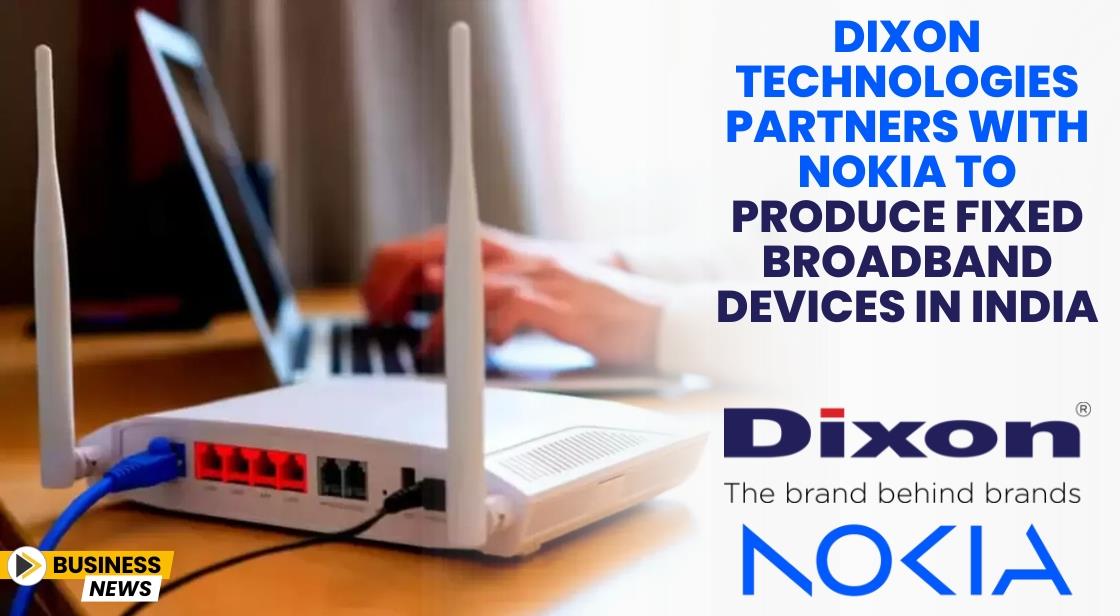Dixon Technologies Partners with Nokia to Produce Fixed Broadband Devices in India

News Synopsis
Dixon Technologies, a prominent electronics manufacturer in India, has teamed up with Nokia, the Finnish telecommunications giant, to produce fixed broadband devices in India. This strategic partnership responds to the increasing demand for high-speed broadband services across the country, fueled by growing adoption of Fiber to the Home (FTTH) and 5G Fixed Wireless Access (FWA) technologies. According to a joint statement, this initiative represents a substantial move in supporting India’s digital transformation.
Production in Noida’s Dixon Electro Facility
The production will take place at Dixon Electro's facility in Noida, a subsidiary of Dixon Technologies. The plant has the capacity to manufacture up to 10 million broadband devices annually. These devices will encompass a range of next-generation technologies, including GPON (Gigabit Passive Optical Network), 5G FWA, and Mesh Wi-Fi, capable of delivering broadband speeds of up to one gigabit per second per household. The collaboration is set to enhance India’s internet infrastructure by providing locally manufactured devices tailored to meet rising consumer and industrial needs.
Local Development and Economic Impact
Nokia’s Research and Development Centre in Chennai will lead the design and development of these cutting-edge broadband devices. Dixon Electro will oversee the large-scale manufacturing process, ensuring high-quality production standards. Additionally, this partnership is expected to contribute to the local economy by creating approximately 3,000 new jobs, furthering India's employment landscape and supporting the country’s commitment to self-reliance in electronics manufacturing.
Nokia's Role in India’s Broadband Infrastructure
Nokia has long been a significant player in India’s broadband infrastructure, currently supporting over half of the country’s FTTH networks. The company’s fiber broadband technology has already connected numerous Indian households, and now, the integration of 5G FWA and Wi-Fi beacons will further elevate its offerings to Indian broadband operators. Nokia’s presence in the Indian market is expected to strengthen through this collaboration with Dixon, particularly as it expands its fixed network capabilities to accommodate India’s digital growth.
Driving Digital Transformation in India
This partnership aligns with the broader vision of accelerating India’s digital transformation. By leveraging Nokia’s advanced expertise in FTTH and FWA technologies, the collaboration aims to provide households with high-speed, reliable connectivity. Dixon and Nokia are dedicated to deploying next-generation broadband solutions in India, helping bridge the digital divide and improving accessibility to high-quality internet services across the country.
In a recent statement, Atul B Lall, Vice Chairman and Managing Director of Dixon Technologies, expressed enthusiasm for the collaboration, highlighting its importance for India’s electronics industry. "Our partnership with Nokia represents a milestone in India’s manufacturing sector, supporting the vision of a self-reliant India. As we begin local production of these advanced broadband devices, Dixon reaffirms its commitment to expanding India’s electronics ecosystem," Lall noted.
Similarly, Sandy Motley, Vice President of Fixed Networks at Nokia, emphasized Nokia’s commitment to supporting India’s digital ambitions. Motley stated, “Through this partnership, we aim to support India’s transition to a digitally connected future, leveraging Nokia’s expertise in FTTH and FWA technologies.”
Dixon Technologies’ Operational Growth and Expansion
Dixon Technologies has consistently demonstrated robust growth, with a reported revenue of Rs 6,411 crore for the fiscal year 2024. The company operates 23 facilities nationwide, catering to over 100 clients across various sectors. This new expansion into broadband device manufacturing marks a significant step in Dixon’s strategic growth plans, adding value to its existing portfolio and enhancing its capabilities in high-demand tech sectors. The company’s collaboration with Nokia highlights its drive to expand its reach within India’s electronics manufacturing ecosystem.
Significance of the Collaboration in India's Electronics Landscape
This collaboration between Dixon Technologies and Nokia underscores a crucial advancement in India’s electronics manufacturing sector. By focusing on state-of-the-art broadband solutions, they aim to support the ongoing digital revolution in India. The production of locally manufactured broadband devices will not only cater to domestic needs but also potentially open new avenues for exports in the future. This development aligns with India’s broader objective of becoming a global electronics manufacturing hub.
Supporting India’s Digital Growth
As India undergoes a digital transformation across various industries, from finance to healthcare and education, the demand for high-speed internet connectivity is paramount. The initiative by Dixon and Nokia is expected to support this need by making cutting-edge broadband technology more accessible. Through this partnership, both companies are poised to play an integral role in India’s digital future, ensuring that reliable, high-speed internet reaches every corner of the country.
Looking Ahead: The Roadmap for Dixon and Nokia
Looking forward, the collaboration between Dixon and Nokia is likely to set a precedent for other international partnerships aimed at bolstering India’s electronics manufacturing. By investing in local production and advanced research, both companies are contributing to a self-reliant and technologically advanced India. Their joint efforts will continue to drive innovation and enable India to meet the growing demands of a digitally connected society.
This alliance is set to pave the way for new developments in the Indian technology landscape, supporting innovation, creating job opportunities, and reinforcing India’s position in the global digital economy.
You May Like









